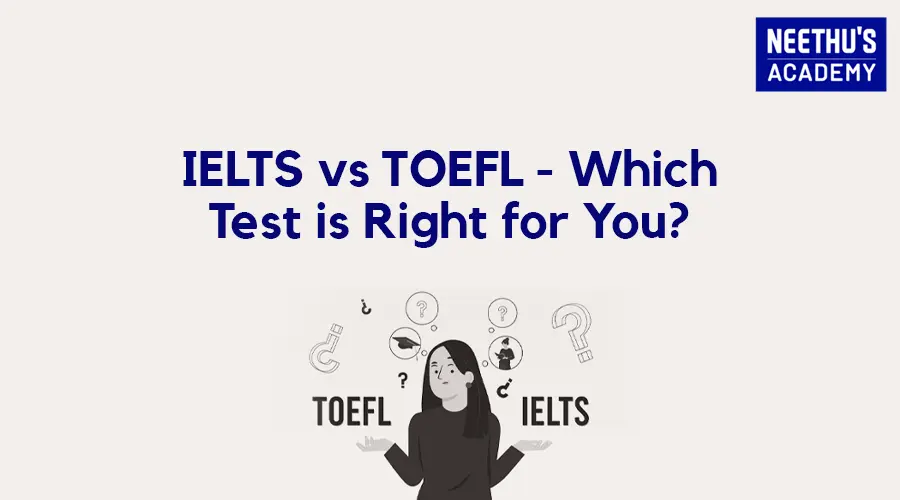IELTS vs TOEFL – Which Test is Right for You?
Are you planning to pursue higher studies or build a career abroad? Then, you must be familiar with the International English Language Testing System (IELTS) and the Test of English as a Foreign Language (TOEFL), the benchmarks for determining English language proficiency by universities, employers, and immigration authorities.
However, though their purpose is the same, IELTS and TOEFL cater to diverse needs and preferences. Thus, it is crucial to understand the difference between IELTS and TOEFL to find out which is the right kind of test for your success.
This blog explains the significant differences between IELTS and TOEFL in structure, scoring, and recognition to help you determine which test is suitable for you.
Overview of IELTS and TOEFL
IELTS and TOEFL are the two major standards for evaluating proficiency in the English language. Both tests evaluate reading, writing, listening, and speaking skills, but they differ in their approach and format.
IELTS is accepted everywhere and has two versions:
- Academics: It is suggested for enrolling in academic programs
- General Training: It is required for immigration and job search.
As for TOEFL, it is also accepted in all institutions and is oriented toward academics.
Test Structure and Format
Here is a detailed discussion on IELTS vs. TOEFL in terms of their structure and format:
IELTS:
- It is administered either on paper or by computer.
- It includes four sections: Listening (30 minutes), Reading (60 minutes), Writing (60 minutes), and Speaking (11-14 minutes).
- The Speaking test is a face-to-face interview with an examiner.
TOEFL:
- It is exclusive as a computer-based TOEFL iBT (Internet-based Test).
- It comprises four sections: Reading (35 minutes), Listening (36 minutes), Speaking (16 minutes), and Writing (29 minutes).
- The Speaking section responses are recorded and evaluated later.
Scoring System
Understanding the scoring systems of IELTS and TOEFL can help test-takers align their preparation to specific test demands:
IELTS Scoring:
- It will be scored on a band scale from 0 to 9 in half-point increments.
- Each section gets a band score, and the overall average band score is also given.
- It reflects an examinee’s ability with descriptive labels ranging from “non-user” to “expert.”
TOEFL Scoring:
- It is scored on a scale ranging from 0 to 120 points.
- Each section is scored out of 30 and then added together.
- Gives numerical feedback regarding a test-taker’s proficiency. The higher the test score, the better the English-language ability.
Test Delivery and Availability
The availability and delivery methods of IELTS and TOEFL, which can be taken at a test center or home, meet a wide range of preferences and geographical locations well:
IELTS:
- This test destination is available in over 4,000 test centers across more than 140 countries.
- It comes in two formats: paper-based and computer-delivered. The paper-based format takes approximately 13 days, while the computer-delivered format provides results in 3-5 days.
- Tests are typically held four times a month, providing flexibility in scheduling.
TOEFL:
- The test is available in over 200 countries and territories.
- The TOEFL iBT results take 4-8 days.
- Frequent test dates, with sessions, are available over 170 times a year.
Test Content and Question Types
The content and question types of the IELTS and TOEFL tests reflect fundamentally different methods of testing for English language proficiency:
IELTS:
- It has a variety of question types, such as multiple-choice questions, short-answer questions, labeling diagrams, matching, and essay writing.
- The Speaking section involves a short speech and discussion over a live interview with an examiner.
- Tasks are designed to reflect real-world usage, from interpreting maps to discussing general topics.
TOEFL:
- It primarily uses multiple-choice questions across the Reading and Listening sections but also includes tasks like essay writing and speaking based on reading and listening tasks.
- The Speaking section requires test-takers to speak into a microphone, with responses recorded and evaluated later.
- It emphasizes academic English with content that simulates university lecture environments and academic reading material.
Acceptance and Recognition
IELTS and TOEFL are accepted and recognized globally, influencing test choice depending on your destination:
IELTS:
- Universities in the UK, Australia, New Zealand, Canada, Europe, and Ireland widely accept it.
- Various professional and government bodies also recognize it for immigration purposes.
TOEFL:
- It is predominantly recognized by American universities and preferred by institutions in the United States.
- It is less commonly used for immigration compared to IELTS.
Preparation and Resources
You must have access to proper resources and strategies to ensure effective IELTS and TOEFL preparations. Here are some top tactics to help you crack the test:
- Opt for English language classes that focus on all four core skills: Speaking, Writing, Reading, and Listening.
- Practice the previous years’ exam papers to understand the format of the test.
- Utilize the resources available on the EDP and ETS official website, such as the sample tests and some learning interactive tools.
- The difficulty of both examinations demands serious preparation, considering the specific format and type of questions asked. A combination of self-study and professional guidance can significantly enhance your chances of success.
Pros and Cons
Choosing between IELTS and TOEFL involves weighing their respective advantages and drawbacks
IELTS:
| Aspect | Pros | Cons |
|---|---|---|
| Speaking Test | Face-to-face speaking test mimics real-life interactions. | The speaking section might be intimidating due to live interaction. |
| Acceptance | It has broader acceptance in the UK, Australia, and for immigration. | It has fewer test dates for the computer-based version. |
| Test Format | The paper-based option suits those less comfortable with computers. |
TOEFL:
| Aspect | Pros | Cons |
|---|---|---|
| Test Delivery | All sections are completed on a computer, which is ideal for knowledgeable individuals on computers. | Requires strong typing skills for essays. |
| Acceptance | It is highly accepted in American universities. | It has a less personal interaction and might feel less engaging. |
| Availability | Frequent test dates are available. |
Which Test Should You Take?
It depends on one’s needs: IELTS is a better choice for those who have to go to the UK or Australia or want to migrate. Go for TOEFL if you wish to study in the U.S. Assess your ease with each test style and setup.
Conclusion
To understand which one to prepare for, you must assess the differences between IELTS and TOEFL. For that, it is crucial to factor in the required academic or professional goals, preferred country, and test format to improve your chances of success.
If you want to pursue your studies or career in the UK, Australia, or Ireland, go for IELTS. However, if your dream destination is the USA, opt for TOEFL, which conducts paperless computer-based tests
Frequently Asked Questions





